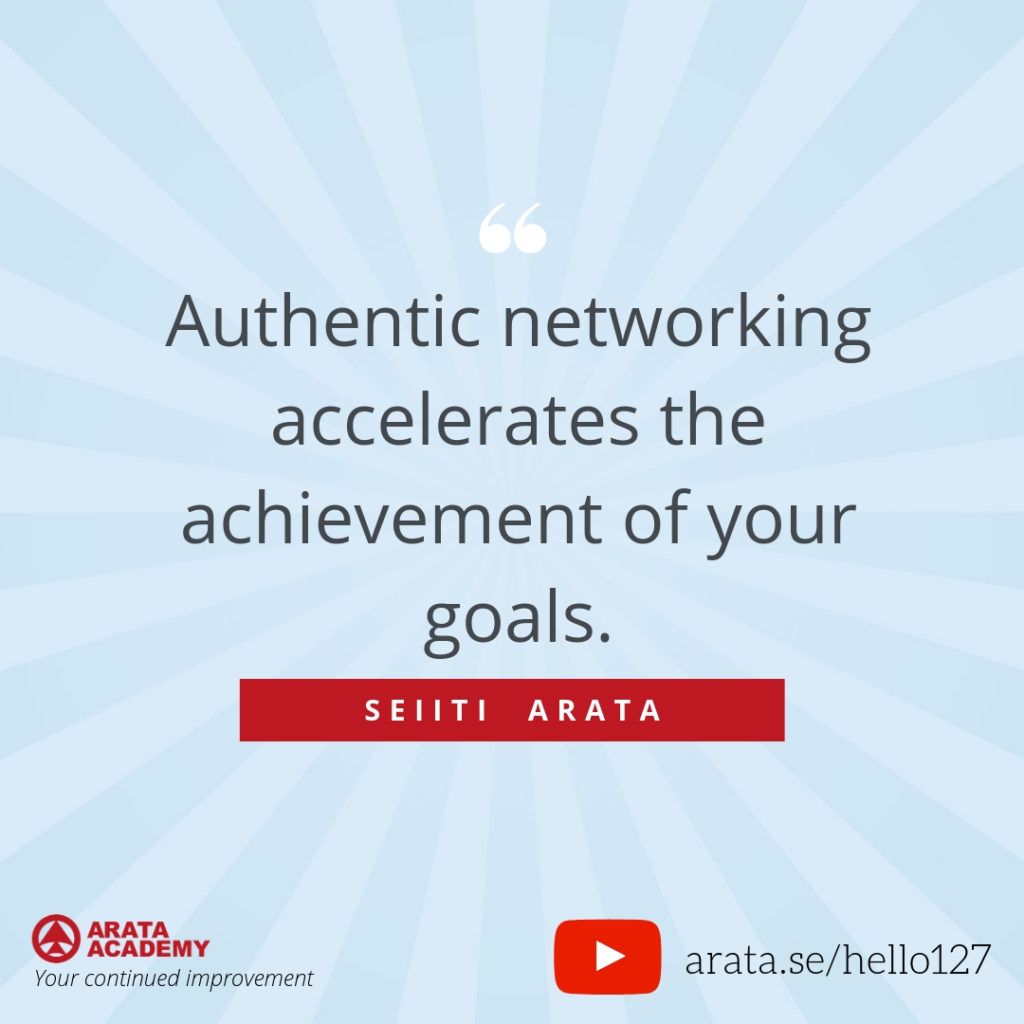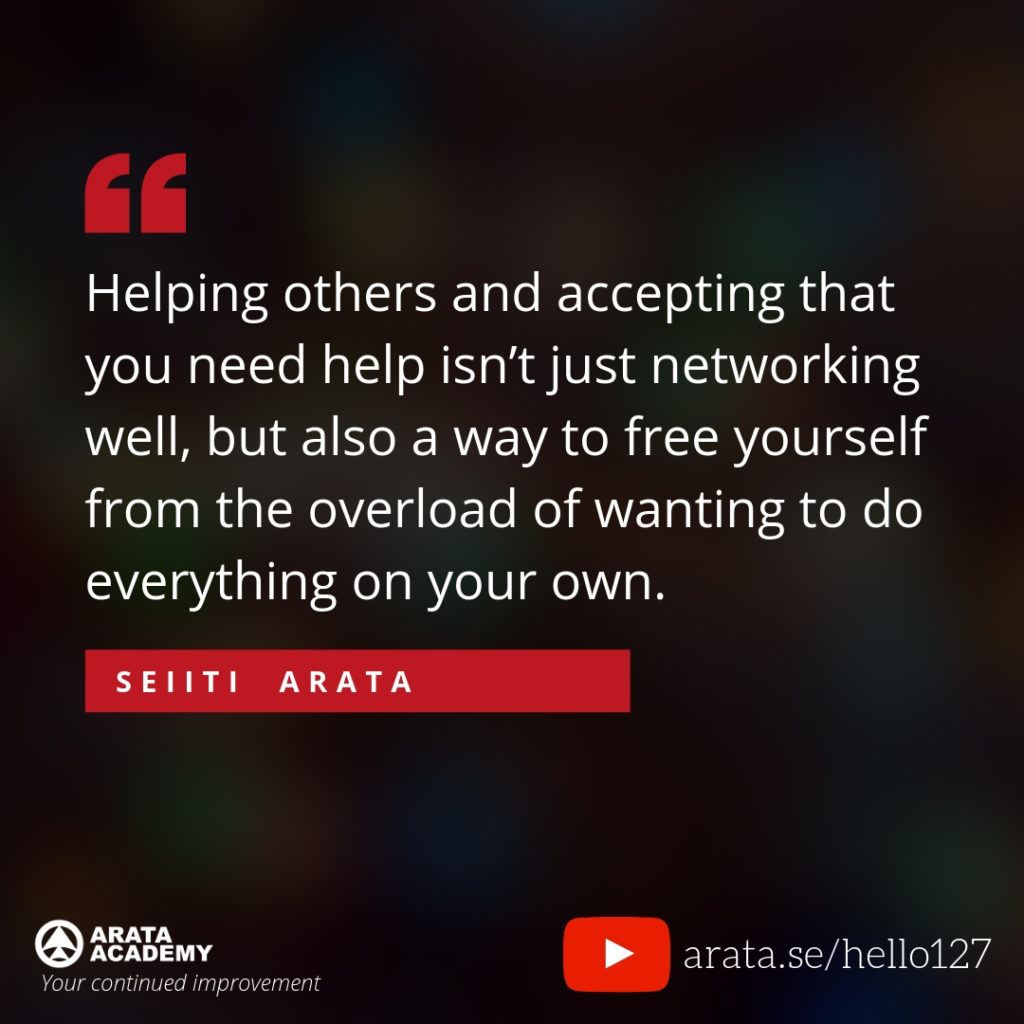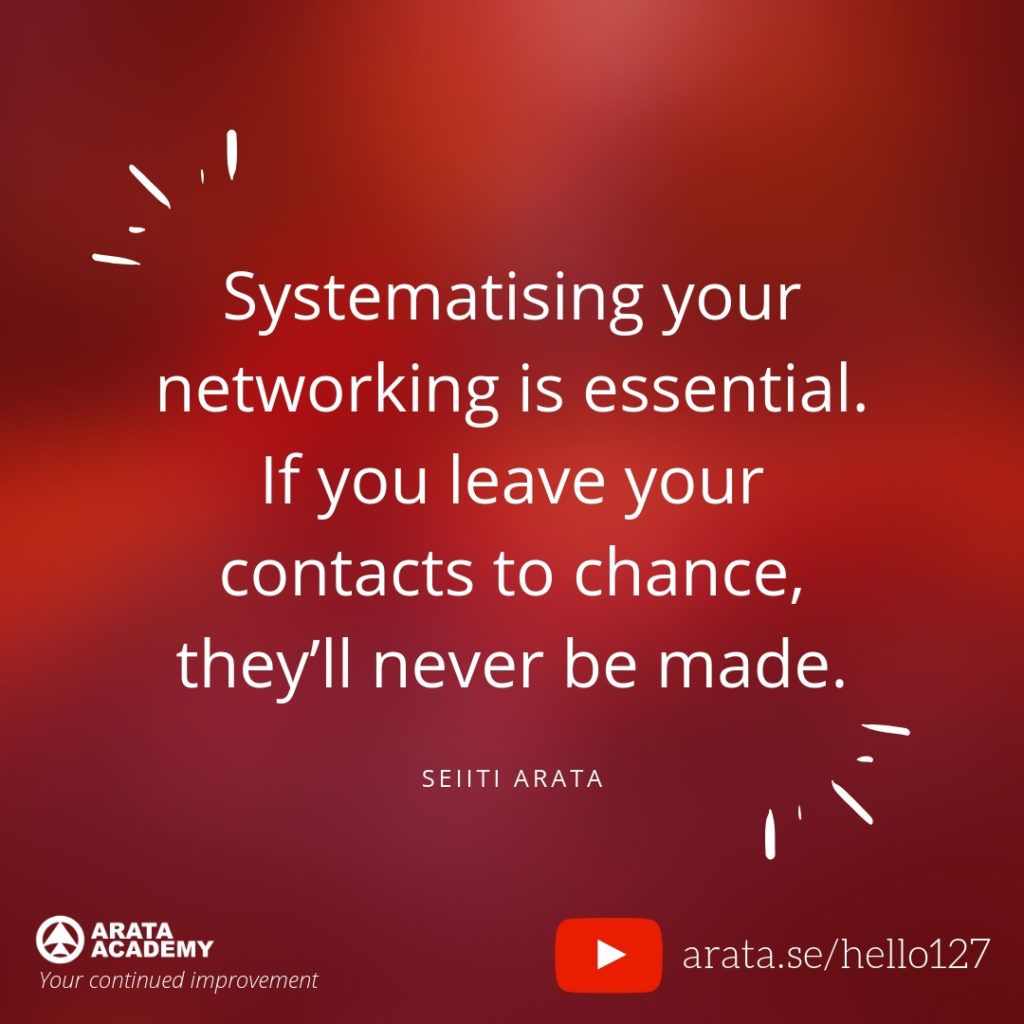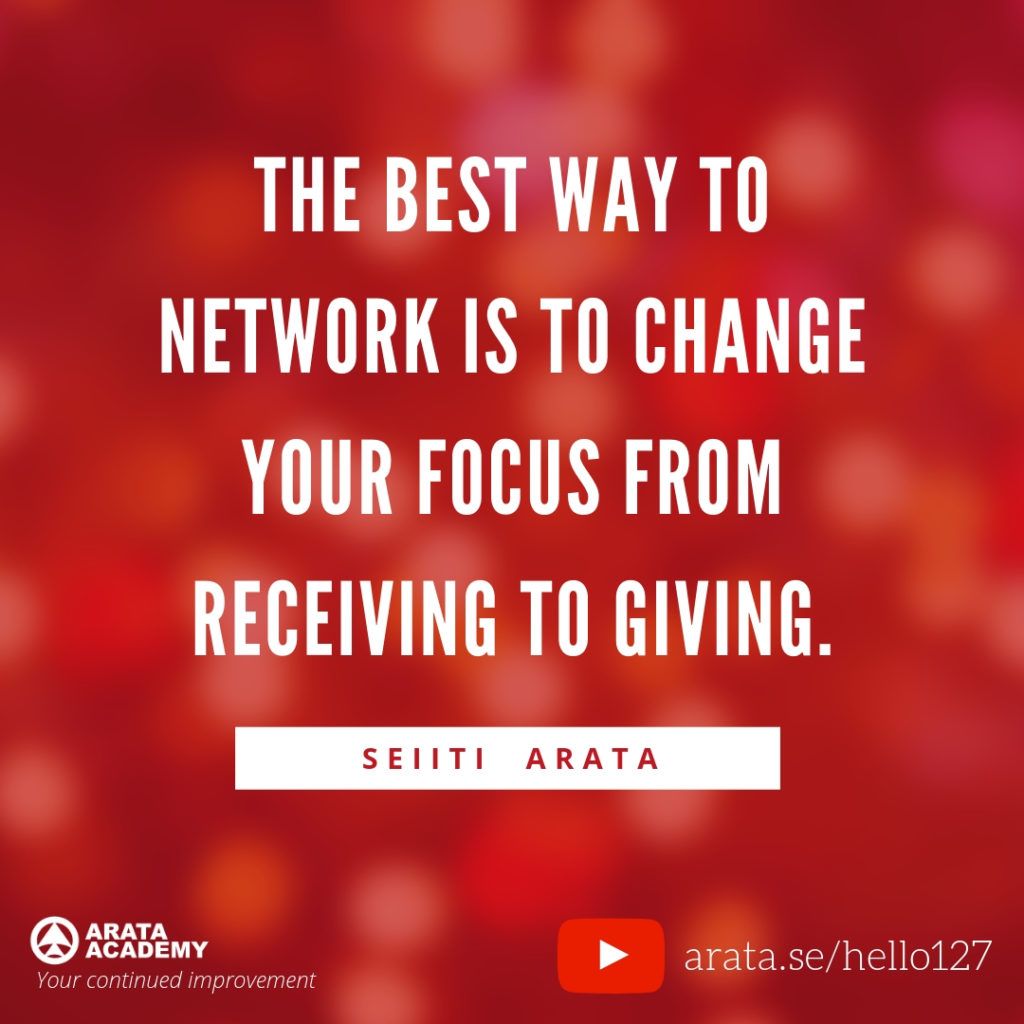Hello! Seiiti Arata. When I talk about networking, there are two types of people. There’s a group of people who like to network because they get great results. These are the people that always go to events, exchange business cards and always have a smile on their face and an elevator pitch on the tip of their tongue, a readily rehearsed story to quickly tell about what they do for a living.
And there’s a second group of people who don’t even know what networking is, or have an aversion to it, who think it’s unpleasant, or embarrassing, or simply really annoying to have to connect with other people professionally.
Okay, if you’re part of the second group, if you can’t stand networking or if you don’t know exactly what it’s about, it’s you I want to talk to now. Today you’re going to change your way of thinking about networking and you’re going to start to use networking to earn more money, be a happier person and also practice your generosity, helping other people.
Human society has developed through collaboration
The historic moments that humanity most progressed were those in which there was a profound change in the way of collaborating: the development of language to communicate, the union of tribes to hunt and for agriculture, the invention of money to facilitate commerce, the creation of religious codes and legal systems to regulate behaviour, and scientific and industrial revolution.
None of this would have been possible without good collaboration. Moreover, what happened with the groups of humans that didn’t incorporate new ways of collaborating? You studied history and know.
The groups who didn’t know how to quickly organise themselves, collaborate, or develop technologies ended up having an unhappy ending: they disappeared by defeats in combat, weren’t able to survive certain catastrophes or were simply left behind in the race for development.
Individuals realise their true potential through collaboration
Think of any individual that you admire for their achievements. It could be a great businessman, a champion athlete, or an internationally recognised artist. No matter who it is, this person that you’ve just imagined never would have arrived at where they arrived if they had been alone. They know how to collaborate with a support team, lawyers, trainers, mentors, accountants, suppliers, colleagues in their profession.

Their ability to collaborate with other people is without doubt the most important factor for realising their potential. Collaboration is as important for your career as it is for your personal projects and your relationships.
Because of this I’d like to show how networking can quickly advance your personal and professional projects. In the course Double Your Salary I explain how to use networking in an intelligent way. But for this it’s necessary to leave prejudice to one side and learn to help others and accept that you need help.
The first stage for you to have all the benefits of good networking is simply learning the art of collaboration.
Where did our rejection of networking and collaboration come from?
The rejection of networking comes from school, from ego and from networking events. I’ll explain each of them.
Firstly, the old-fashioned model of school doesn’t strengthen our ability to collaborate. Unfortunately, most of us were taught to work alone at school. You have to study alone and take your exams alone. Your grades are based on the individual answers that you gave. If you look at other peoples’ answers, it’s severely punished. Even when you did group work, a lot of the time the grades and observations were individualized.
However, real life isn’t like that. In any company, you’ll always collaborate with other people. Your abilities and knowledge are combined with what other people know and do so that together you’ll be able to create a product or provide a service.
Furthermore, the ego is one of the main barriers to networking. The ego can even hold you back when you think you need to be better than everyone. Don’t let your pride be a barrier to your growth. Humility teaches that you don’t need to know everything. You will not be able to know everything. What you need is to know how to contact the people that know more about a specific subject.

Another source of networking rejection is the actual networking event! There are times when you’re calmly working in your office and end up being invited to a commercial event. And, without having been duly prepared, you end up really anxious, not knowing exactly how to behave at the event. This trauma worsens when you find yourself surrounded by annoying, clingy people, wanting to sell you something or trying to invite you into some pyramid scheme or something else you hate.
Because of this, we need to make a conscious effort so we can concentrate on the positive aspects of networking and learn to use collaboration in a positive way.
It can seem difficult, but it’s actually liberating.
The freedom of not having to do everything on your own
If you’re one of those people who feels overloaded, know that this draining feeling comes from insisting on doing everything on your own.
For a life that’s calmer, more productive and satisfying, we have to learn to collaborate and join forces with other people. And in the same way that you should be open to receive help, you should also be willing to gently help other people resolve their problems.
It can seem contradictory to want to create even more obligations, but you’ll only be able to have good people around you when you yourself are also a good person.
Furthermore, this collaboration will be good for all sides. You’ll help others with what you’re good at and receive help with what you’re not so good at.
You must be exceptionally good at something. The millennial secret to the advancement of civilisation is to specialise in a task and surround yourself with people of other specialisations. This allows an exchange of value. This is how you’ll also be able to connect with exceptionally good people. You don’t need to be good at everything. But you have to be good at something.
Good networking is an exchange of value
One of the best ways of measuring if networking is being done well is to see if there’s value being exchanged. The essence of a collaboration is when those involved are receiving or offering value, managing a final result that wouldn’t be possible acting in an isolated way. For these, we’ll use three keys: specialisation, systematisation and generosity.
Specialisation allows you to have something to offer for the exchange of value. To increase the value exchanged, it would be very useful if you were a specialist in a subject and offered help on this specific subject for those who need it.
For example, I can say I’m a specialist in recording videos. If someone who has a problem recording videos wastes hours trying to solve a problem, I can probably tell this person how to solve it in a few minutes.
Let’s continue the example. Imagine I don’t understand anything about taxation and I need to solve some bureaucracy about taxes. Instead of wasting hours trying to understand what to do on my own, I could contract the help of an accountant, who would solve everything in a few minutes. I gain time. And with more time, I can do other more valuable things.
Now let’s talk about systematization. What else can you do to facilitate the exchange of value, apart from being good in a certain area? You can be the first person to stimulate the exchange. In the same way that you would feel shy, anxious, uncomfortable or lost in a networking event, it’s quite likely that the other people are also quite uncomfortable.
Aim to make the first move. Learn to make your presentation in an elegant, simple and friendly way. When you do this in an organized and systematized way, following procedures through a certain model, you’ll have much better results than if you improvise in an attempt to be more spontaneous.
Obviously you can and should be spontaneous, however, through a model that’s proven and systematic. Systematization means that you have a system. You can, for example, define in your system that you’re going to participate in a minimum of two and a maximum of six networking events a year. And, at the end of the event, you’re going to choose the relevant contacts and stay in touch with them, writing news or inviting them to a phone call every x days. You can also define that at least once a year you’ll have a meeting with your old clients. And that within your circle of friendships, you’ll phone them on their birthday and will also make an effort to arrange a dinner every two months at least.

Why do we need to systematize? The reason is that without a system, probably neither you or the other person are going to take the necessary actions to start or nurture that relationship. The rush of everyday life can be a problem for relationships. We go months or years without getting in contact with important people or loved ones, simply because of a lack of a system.
You should define this previously, because leaving it to chance, you’re probably not going to make any of these contacts. But this doesn’t mean that your contacts should be artificial. Always be authentic, using clear communication.
Beyond specialising in something so you can contribute a greater value and developing your systems to really be able to implement networking, you also need to cultivate generosity. Creating networks of contacts will be more powerful when you have your focus on contributing. And not receiving.
And here I’m not talking about contributing out of a desire to receive, in helping only thinking of gaining something in return.
I’m talking about contributing from a perspective of abundance, as in, I have so much that my only choice is to contribute.
This change in perspective is very important. If you’re contributing just because you want to receive, you’re coming from a perspective of scarcity. Change your focus and think of helping just for the pleasure of helping.
If the other person contributes in return later, it will be very welcome, but you’re not waiting for this. You’re not going to be resentful for having contributed more than you received. You’re not going to keep track of who has contributed more than who.
With time, you’ll get used to naturally being a person that helps just to help. In the same way that the rain wets, in the same way that the sun heats, in the same way that clouds cast shadows, you are a person in the world that contributes. It’s part of your nature and it’s not a type of conditional behaviour depending on certain requisites, depending on the behaviour of the other person. That’s just how you are.

How to put good networking into practice
When you’re getting in contact with someone for the first time, get straight to the point.
Your first seconds of interaction should be focused on what you can offer to the other person that’s of use.
Be brief instead of wasting too much time talking about yourself, your company, your experience. Say how it is that you can help the other person and ask if they are interested in knowing more.
If they say that they’re not interested, don’t insist. Don’t be a clingy person, don’t keep annoying them. It’s okay if they’re not interested.
Keep the relationship light. Say that in case they need it one day in the future or if they know anyone that needs it, it would be a pleasure for you to help. Respect the space of others.
The importance of this type of attitude has grown with the passage of time. In the past, the model of work was just that you graduate, start to work in a company and maybe stay in this same company until the time of your retirement.
These days a much more agile exchange between different companies is more common. More and more people are working around projects. When the project ends, you have to search for a new project that maybe the same company offers or maybe you’ll have to find another company. It’s fundamental that you have a connection with various people to be able to construct a career.
To serve and help, you should help the flow of good information. If you notice that there are people around you that could meet each other, invite them to a café and introduce these people explaining the reason that you think they could make a good collaboration.
If a personal meeting is complicated, simply send an email to both. If you come across a video, a book, any useful information, think about who could most make use of it and forward it. Don’t be a hoarder of information. Be a distributor of information.
In this way, when big opportunities come up, people will probably remember you as an excellent option to participate in projects that can lift your career to another level, who knows, even duplicating your earnings.
Networking is helping others and accepting that you need help. If you have prejudiced ideas about networking, open your mind and realise that everything you do has the involvement of other people.
To learn to collaborate with others, be humble and recognise that you need help. That you don’t know everything and that other people can solve in minutes problems that you would take hours to solve.
Recognise that this is a way to take a great weight off your shoulders. The weight of wanting to do everything by yourself. Opening your mind to collaboration is an intelligent way to free yourself from the feeling of loneliness, overload and inability.
For all this to work, be authentic. Offer help to others in a systematic way in what you specialise in. But help without hoping for something in return, just for the pleasure of helping. With time, this will become something natural for you.
And here comes a great irony. Even without hoping for anything in return, things will probably start to happen for you. Other people will also start to help you. Your personal and professional objectives will be achieved much more quickly with the help of these people. And soon your personal life and your career will be on another level. For you who wants even more orientation about how to connect with other people and accelerate your professional growth, including your salary, I invite you to our professional development course Double Your Salary accessing https://arata.se/dys

